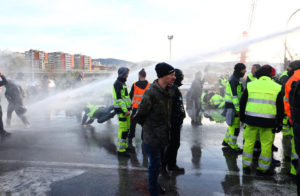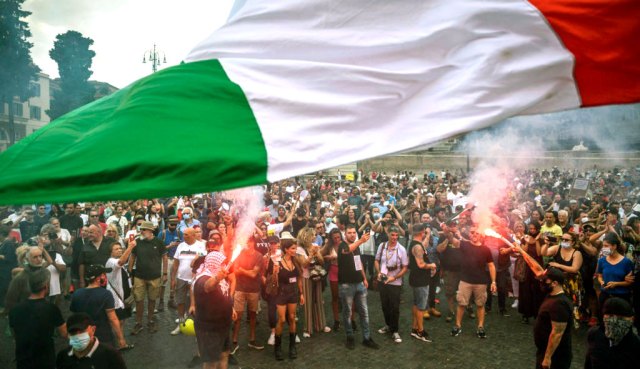“We believe that it’s an instrument of mass social segregation” (Antonio Masiello/Getty Images)

In Italy, there is only one mainstream political party outside Mario Draghi’s coalition government — Fratelli d’Italia (FdI, or the “Brothers of Italy”). The party is surging in the polls: its support has shot up from just over 4% in the 2018 General Election to around 20% today — and there’s an excitement in the ranks that “the brothers” may, paradoxically, gift Italy its first female Prime Minister in Giorgia Meloni.
It’s a party both proud of and reticent about its political ancestry: Fdl emerged — through a number of incarnations — from the post-war ashes of Benito Mussolini’s National Fascist Party. It’s something that still causes public embarrassment, though not enough to stop FdI putting forward Mussolini’s granddaughter, Rachele, in this month’s city council elections in Rome (she received the highest number of preferential votes of all councillors).
Meloni, meanwhile, is keen to emphasise that her party is merely importing the best of Italian nationalism into indecisive and dangerous times. She is bullish about performance in the polls — it has overtaken Matteo Salvini’s Lega — and, this summer, she published an autobiography which became an unexpected bestseller. The book’s title, I’m Giorgia, comes from a mantra she uses at rallies: “I’m Giorgia, I’m a woman, I’m a mother, I’m Italian, I’m a Christian: you won’t take that away from me!”
It’s a sign of how far the party has moved from its totalitarian ancestry that it is now trumpeting itself as the only party defending freedom and democracy. It has vociferously decried the democratic short-circuit of technocratic Prime Ministers; first the university law professor, Giuseppe Conte, and now Draghi, a career banker. “Italian democracy doesn’t need carers,” Andrea Delmastro, an FdI MP, tells me. “We’re resisting in the trenches for democracy.”
As a result of the pandemic, both of those unelected Prime Ministers have ruled through state-of-emergency decrees and inflicted unprecedented restrictions on civil liberties. Take Draghi’s Green Pass legislation, which came into force last week and requires a vaccination certificate (or a negative Covid test) to access all workplaces and social locations (restaurants, bars, libraries and so on). The legislation is draconian by Italian standards, and has led to nationwide “No Green Pass” (NGP) protests that have been scorned by the Left and listened to, and sometimes led, by the Right. “We believe”, says Delmastro, “that it’s an instrument of mass social segregation.”
But the NGP protests raise a problem as well as an opportunity for FdI. At one recent demonstration in Rome, a group of speakers from Forza Nuova (a genuine Fascist party) led a breakaway fringe in attacking the headquarters of one of the country’s largest unions, CGIL. In scenes reminiscent of the January 6 ransacking of the Capitol, Italy’s version of the “Proud Boys” smashed their way into the building with batons, helmets and flags.
The event brought to the surface the recurrent question always whirling around Fratelli d’Italia: how much ideological distance really exists between themselves and their fringe far-Right cousins? If that question is familiar, there’s another, more nuanced one: how much is the demonisation of FdI actually blinding commentators to any serious analysis of its policies and appeal?
***
Trieste, October 15. NGP protesters have gathered at the city’s port where workers (around 40% of whom are unvaccinated) are striking against the Pass. The pier has been turned into a cross between a stadium singalong and a seaside party. The chants are all from the ultra (hardcore football fans’) songbook: “la gente come noi non molla mai” — “people like us will never be moved.” Red-faced rogues are wheeling trolleys full of lager. There are megaphones, whistles, drums and plenty of pots and pans being banged. It’s noisy and fun.
The port-strikers are wearing Hi-Viz jackets, but like a music festival there’s so much fancy dress it’s hard to tell who is who. And that’s partly the point: it’s a movement so variegated that it’s impossible to label. Just as on the terraces, there’s a mixture of idealists, extremists and eccentrics, of accountants, lawyers, HGV drivers and nurses. After the violence at the rally in Rome, there have been efforts to avoid all political banners so the unions, the neo-Fascists, the ultras, the politicians and even plenty of police are now plainclothes.
It’s no coincidence that Trieste has become the epicentre of NGP protests. The port is a vital nexus of European logistics, sending eight container trains to Budapest every day, and 12 to Munich. And Trieste has always been a hot political cauldron. The city is hybrid (Austro-Hungarian and Italo-Slavic) and home to many minorities outside the Catholic majority (Jewish, Protestant and Orthodox). It’s renowned as a cultured, literary and liberal city, but it’s also known for its determined, frontier Fascism. It was here that, in 1938, Mussolini chose to announce his Race Laws and it was here that FdI held its second national conference.

Trieste politicians have made the 1943 Foibe killings — where Italians were murdered by Yugoslav partisans in the nearby mountain ravines — an inversion of the Fascist-equals-Baddie narrative: there’s now a national day of remembrance. Recently a statue of the proto-Fascist writer, Gabriele D’Annunzio, was added to the city’s streets. One city councillor has campaigned to name streets after famous Fascist combatants while the deputy mayor, in 2019, won national acclaim (and scorn) for putting the blankets of the homeless in a skip. It’s a city whose politicians have a taste for old-fashioned order.
Last weekend Roberto Dipiazza secured his fourth term as the city’s centre-right Mayor. A suave former businessman, he dismisses the port protests as “madness”. When I point out that many of the parties supporting his candidacy are mixing with the NGP crowds, he smiles: “Don’t confuse politics with common sense.”
Like the majority of the Italian Right, he’s vehemently dismissive of those concerned about a Fascist resurgence: “Every time there’s an election, the Left pulls out this thing about Fascism. It’s their attempt to compact their electorate by saying ‘watch out, Fascism’s coming back’,” he explains. “Basta,” he adds wearily, “basta.”
Back at the port protests, meanwhile, it is clear how much Covid, just like post-industrialisation and mass immigration before it, has nudged many traditionally Left-wing voters into supporting emerging Right-wing movements. Whether or not their cause is rational — “We’re not flat-earthers,” one demonstrator tells me — it’s plain to see that these protesters feel scorned by their natural allies on the Left, who have offered only verbal slaps to the NGP movement. The protest, as a result, is a place where political silos dissolve. One unionist was quoted as Corriere della Sera as saying “I’m a Communist who feels more at home with the Fascists”.
The NGP movement may be a sub-plot to national Italian politics, but it remains an illuminating one. The actual industrial action will probably peter out — police moved in with tear gas and water cannons on Monday — but for this disgruntled minority, there’s a strong sense of political alienation, especially since the mainstream unions have recently argued against a minimum wage. “Politics is dead,” Stefano Puzzer, the stocky leader of the port protest, tells me. “These people haven’t voted for years.”
In some ways, this NGP protest is not dissimilar to that other coalition of disillusioned voters, the Five Star Movement (M5S). Once polling at close to 30%, the M5S is now imploding and fracturing, and FdI clearly sees those frustrated voters who followed Beppe Grillo as their route to power. It’s not as improbable as it might appear. After spending time with the protesters, I started to sense something melancholic.
Many are sitting alone and looking at their phones. When a song begins, they join in with a tangible euphoria that they’re finally part of something. It’s as if this protest has given them a cause and a fellowship, even an identity.
And if there is one thing Meloni is offering in spades it is “identity”. One of the most repeated words in her keynote speeches, “identity” is, she says, “the principle enemy of the global mainstream”. By identity, she means “family”, “nation” and “Christian” — all concepts which are “under attack” because of “the politically-correct dictatorship in the hands of Silicon Valley ”. This very broad-brush analysis contains more than trace levels of paranoia: BLM thugs are compared to the Taliban, while global financial speculators want to “disarticulate nation states to make them weak”.
But that paranoia appeals to those who feel marginalised and ignored. Like cheap lager, Meloni goes straight to the belly and the bloodstream. Once you’re tipsy, it’s easy to nudge “identity” into “identitarianism”, which is the closest thing our century has to Fascism.
Perhaps it’s unsurprising, then, that the accusation sheet against the Fdl is long and familiar: critics say that behind the façade of a moderate, democratic party, it still celebrates the personalities, iconography and even ideas of 1922-45. There are many examples of Fascist memorabilia being spotted in FdI homes, if not offices. The rasping Ignazio La Russa, who led the Fdl before Meloni, even had a meeting with Forza Nuova leaders in March this year, so Meloni’s perplexed response to the recent Rome violence (“I don’t know the matrix”) sounded decidedly disingenuous.
Certainly there have been many recent examples of squadrismo (street-thuggery), often with the aim of strike-breaking. Every few years, a radicalised far-Right gunman launches an attack, while Paolo Berizzi, an investigative journalist who has written extensively about the far-Right, has been forced to live under armed protection. The alarms warning against contemporary Fascism clearly aren’t, as right-wing politicians say, “all cry-wolf”.
Nor is it a phenomenon confined to the far-Right. Enrico Michetti, the centre-Right candidate who ran to be Mayor of Rome, recently wondered whether there was more sympathy for the murder of Jews in the Holocaust than for victims of the Foibe because the Jews owned banks and “belonged to a lobby able to decide the destiny of the planet”. Doubtless the recordings were released with cynical timing by his political opponents, but they still revealed a man who draws, unconsciously or otherwise, on far-Right tropes.
The problem for the Left, however, is that they don’t have the courage to offer their own cheap lager. Nothing they say ever speaks to the belly. The Italian Left is very good at being against things (Fascism), but it offers no narrative and no cause, neither a sense of struggle nor a direction. It doesn’t dare propose legislation which its rank-and-file have been clamouring for, such as “Ius Soli” (granting Italian citizenship to all born in Italy) or the proposed anti-homophobia law. The party has studiously avoided commenting on the recent referendum to decriminalise cannabis.
Leaders on the centre-Left point to successful mayoral elections in Milan, Bologna and Naples earlier this month as evidence that their sober, centrist strategy is working. This week, the Left also won mayoral run-offs in Rome and Turin with around 60% of the vote, and even won in the Right-wing strongholds of Varese and Latina. Only in Trieste did the centre-Right predictably win.
But the real victor in Italy’s recent elections was the anti-political non-vote: turnout was only 44%, down 9% from five years ago. “Very, very many people no longer believe that it’s possible to change things with the vote,” Marcello De Angelis, a former National Alliance senator, tells me. “Abstentionism is the degenerative illness of democracy.”
Whether it’s terminal or not remains to be seen. But if Meloni wants to become Prime Minister, she knows she will have to court that sceptical minority who now believe, like the NGP protesters, that democratic change is an illusion.










Join the discussion
Join like minded readers that support our journalism by becoming a paid subscriber
To join the discussion in the comments, become a paid subscriber.
Join like minded readers that support our journalism, read unlimited articles and enjoy other subscriber-only benefits.
Subscribe